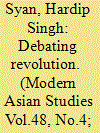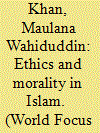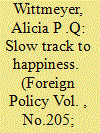| Srl | Item |
| 1 |
ID:
132968


|
|
|
|
|
| Publication |
2014.
|
| Summary/Abstract |
This paper examines the public debate that happened among Delhi's Sikh community following the formation of the Khalsa by Guru Gobind Singh. The detail of this debate was expressed in the early eighteenth century Sikh text, Sri Gur Sobha. The Sri Gur Sobha explains how Delhi's Sikhs became divided into pro-Khalsa and anti-Khalsa factions, and how this conflict resulted in a campaign of persecution against Delhi's Khalsa Sikhs. In this paper I endeavour to analyse exactly why this dispute occurred and how it reflects wider political and socio-economic processes in early modern India and Sikh society. In addition, the paper will explore how the elite Khatri community consequently became an object of hatred in eighteenth century Khalsa Sikh literature.
|
|
|
|
|
|
|
|
|
|
|
|
|
|
|
|
| 2 |
ID:
130787


|
|
|
|
|
| Publication |
2014.
|
| Summary/Abstract |
The concept of human values is by its very nature universal. That is why we find uniformity in the teachings on human values in all religions. If there are any differences on this subject, they relate to points of reference, i.e. to religious books, rather than to the human values themselves.
|
|
|
|
|
|
|
|
|
|
|
|
|
|
|
|
| 3 |
ID:
129229


|
|
|
|
|
| Publication |
2014.
|
| Summary/Abstract |
Anyone who has been in a Muslim country during Ramadan knows the transformation that comes about with the first sighting of the crescent moon. During the holy month, the devout fast from sunrise to sunset. Bustling thoroughfares go quiet; office hours are shorter to accommodate fasting employees; and business grinds to a halt, to the frustration of expats and foreign partners. Now, a new paper from two Harvard University researchers confirms what until now has only been a nagging suspicion: Religion isn't good for the economy. Economists Filipe Campante and David Yanagizawa-Drott examined data from every Ramadan since 1950, using the amount of time spent fasting as a measure for intensity of religious practice. Focusing on countries that were more than 75 percent Muslim, they found that when people spent more time fasting -- when Ramadan fell during the long days of summer, for instance -- it took a bigger toll on economic growth. Increasing the average daily fast in a country from 12 to 13 hours, for example, decreased GDP growth by about 0.7 percentage points, the authors found. More-intense religious ractice, in other words, left worshippers poorer. And being poorer makes you less happy, right?
|
|
|
|
|
|
|
|
|
|
|
|
|
|
|
|